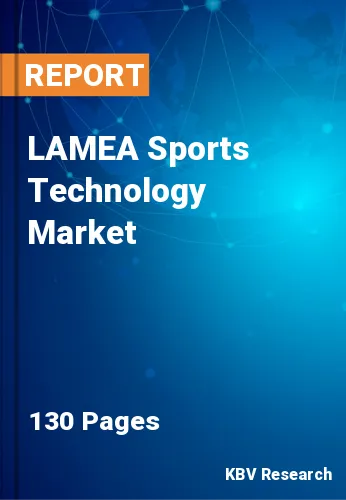The Latin America, Middle East and Africa Sports Technology Market would witness market growth of 20.4% CAGR during the forecast period (2022-2028).
Success in athletics is always based on one's capacity to deliver. Moreover, one of the most significant ways AI is changing the sports industry is by how businesses may use it to evaluate individual player performances. Coaches and analysts can evaluate a player's skills and weaknesses and follow their development over time with the aid of AI-integrated technologies.
They might also use metrics to compare player data and identify weaknesses in overall play execution. By spotting strategic trends and coming up with accurate countermeasures, sports technology can give one side a benefit over the other when it comes to defense. In the sports industry, sports technology is also fundamentally altering how coaches view and handle a player's health and safety.
A player's health, fitness, and safety may be monitored by coaches and management due to AI's predictive and diagnostic capabilities. Additionally, it suggests that physical and mental diseases are now recognized and treated more swiftly than ever before. Moreover, wearables like watches and heart rate monitors contain artificial intelligence. These tools track player movements for the best workout sessions and keep track of a player's whereabouts off the field to ensure safety.
Starting with South African school and university sports, Pixellot's AI-Automated production solution will be incorporated into Shoott South Africa's live broadcasts. Matches will be broadcast live on Shoott's OTT platform. The most recent Pixellot system installation was completed at Stellenbosch University, which is holding the University Sports of South Africa Hockey competition, and Pixellot systems will also be placed in 25 sporting facilities and fields by the end of 2019.
The Brazil market dominated the LAMEA Sports Technology Market by Country in 2021, and would continue to be a dominant market till 2028; thereby, achieving a market value of $798.4 million by 2028.The Argentina market is experiencing a CAGR of 21% during (2022 - 2028). Additionally, The UAE market would display a CAGR of 20.1% during (2022 - 2028).
Based on Technology, the market is segmented into Smart Stadiums, Device, Sports Analytics and eSports. Based on Smart Stadiums Offering, the market is segmented into Software and Services. Based on Devices Type, the market is segmented into Digital Signage & Sports Camera and Wearables. Based on Sports Type, the market is segmented into Soccer, Basketball, Cricket, Baseball, Rugby, Tennis, Esports and Others. Based on countries, the market is segmented into Brazil, Argentina, UAE, Saudi Arabia, South Africa, Nigeria, and Rest of LAMEA.
Free Valuable Insights: The Global Sports Technology Market is Predict to reach $48.7 Billion by 2028, at a CAGR of 16.8%
The market research report covers the analysis of key stake holders of the market. Key companies profiled in the report include Fujitsu Limited, LG Electronics, Inc. (LG Corporation), Sharp Corporation, Oracle Corporation, IBM Corporation, Cisco Systems, Inc., Samsung Electronics Co., Ltd. (Samsung Group), Ericsson AB , NEC Corporation, and SAP SE.
By Technology
By Sports Type
By Country
Our team of dedicated experts can provide you with attractive expansion opportunities for your business.

